British Prisoner Accused Of Leaking Secrets To Iran Escapes Jail

An investigation has been launched by the UK’s justice secretary after a suspected terrorist accused of passing information to Iran fled prison on Wednesday.

An investigation has been launched by the UK’s justice secretary after a suspected terrorist accused of passing information to Iran fled prison on Wednesday.
Daniel Abed Khalife was in Wandsworth Prison when he escaped by clinging onto the bottom of a food delivery van. The 21-year-old is accused of trying to leak information to Iran and leaving fake bombs at a military base before his arrest in January.
Charged under the Official Secrets Act, he is accused of collecting personal information about soldiers from the Ministry of Defence joint personnel administration system while serving as a soldier.
Justice minister Alex Chalk told MPs that “strapping” had been found underneath the delivery vehicle and said an internal inquiry must report to him by the end of the week with a list of prison staff who were on duty at the time, notably those at the kitchens and security gates.
“No stone must be left unturned in getting to the bottom of what happened,” he told MPs.
Questions now remain as to how Khalife - labeled a flight risk and in turn, denied bail while awaiting trial - was allowed to work in the kitchen, giving him access to the delivery vehicle, a “privileged job” given usually only to the most trusted inmates, according to former Prison Governor, John Podmore.
Podmore told Times Radio: “Someone like him would not be allowed access to work the kitchen”, suspecting it was a premeditated escape with little chance of his being found. Further questions are being asked as to why, given the nature of the charges against Khalife, he was not in a maximum security category A or B prison such as Belmarsh.

Renewed tensions between Azerbaijan and Armenia portend major geopolitical shifts in the region with the US edging closer to Yerevan as Russia is embroiled in Ukraine.
Armenian Prime Minister Nikol Pashinyan accused Azerbaijan on Thursday of building up troops along the line of contact in Nagorno-Karabakh disputed region and the Armenian-Azerbaijan border. In the past week, both Yerevan and Baku reported casualties after intense shelling near their common border.
The escalation comes amid a continuing crisis over Nagorno-Karabakh where Yerevan and local ethnic Armenian authorities accuse Baku of continuing its “illegal blockade” of the region, resulting in severe shortages of food, fuel, and medicine as well as a rationing of bread. Azerbaijan has justified its nine-month Azerbaijani blockade of the highway linking Armenia to the enclave -- internationally recognized as part of Azerbaijan but populated by around 120,000 ethnic Armenians -- by saying Armenia was using the road to supply weapons to Karabakh, which Armenia denies. The critical Lachin corridor serves as the sole communication route between Armenia and Nagorno-Karabakh.
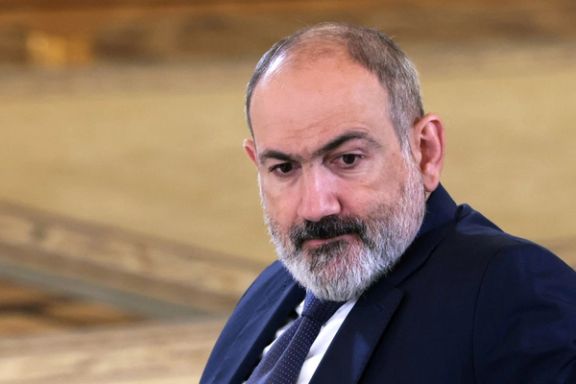
Tensions are simmering as the Armenian Defense Ministry announced earlier in the month that it will hold a joint war game with NATO forces from September 11-20, dubbed Eagle Partner 2023 aimed at increasing the level of interoperability of units participating in international peacekeeping missions.
Traditionally, Armenia has leaned on Russia and Iran, both nations against any border changes between the two longtime rivals. However, Yerevan seems to have recently distanced itself from Moscow, perhaps because Russia is engrossed in its invasion of Ukraine as well as its warming ties with Turkey and Azerbaijan.
The joint drill with the United States forces can be construed as Armenia leaning towards the West to secure support in case of a looming military conflict over Nagorno-Karabakh. Pashinyan recently said that exclusive dependence on Russia does not serve Armenia's security well anymore, a statement that Moscow described as "public rhetoric bordering on rudeness".
RFE/RL’s Armenian Service reported this week that Armenia is providing humanitarian assistance to Ukraine for the first time since the Russian invasion of the country. Sources told RFE/RL’s Armenian Service that Pashinyan’s wife, Anna Hakobian, will personally hand over aid to the Ukrainian side when she flies to Kyiv to attend the annual Summit of First Ladies and Gentlemen.
Despite the small scale of the joint military exercise, Russia – which sees itself as the pre-eminent power in the South Caucasus region that was part of the Soviet Union until 1991 -- said it would be watching closely. "Of course, such news causes concern, especially in the current situation. Therefore, we will deeply analyze this news and monitor the situation," Kremlin spokesman Dmitry Peskov said this week, adding, "In this situation, holding such exercises does not contribute to stabilizing the situation in any case and strengthening the atmosphere of mutual trust in the region."
Russia maintains a peacekeeping force in the region to uphold an agreement that ended a war between Armenia and Azerbaijan in 2020, the second they have fought since the Soviet collapse.
Footage on social media in recent days also showed increasing Azerbaijani military movements near the front line between the two countries. According to Crisis Watch – a global conflict tracker, several cargo aircraft have airlifted hundreds of tons of weapons including ballistic missiles from Israel and Turkey to Baku, adding that “Azerbaijan’s Air Force received a new batch of Bayraktar TB2 armed drones from Turkey in order to use them in its incoming invasion of Armenia.”
“Azerbaijan is ready for another invasion of Armenia. They are just waiting for Turkey to get Iran's permission," said military expert and author Babak Taghvaee. Iran has been deeply concerned about Azerbaijani moves to establish a corridor through Armenian territory to a piece of its territory to the west. While an Azerbaijani military threat exists to force such a corridor, Iran will lose its historic land connection with Armenia. Tensions over the transit road have led to military exercises conducted by the Iranian armed forces near the border with Azerbaijan in recent years.
Earlier in September, US Secretary of State Antony J. Blinken also spoke with Azerbaijan’s President Ilham Aliyev to express the United States’ concern over the deteriorating humanitarian situation in Nagorno-Karabakh, calling to reopen the Lachin Corridor to humanitarian, commercial, and passenger traffic. He also underscored the need for dialogue and compromise and the importance of building confidence between the parties, and pledged continued US support to the peace process.

The Deputy Chief of the Iranian Judiciary has claimed that an investigation into the killing of Qasem Soleimani, the former commander of IRGC's Quds Force, is in progress.
Soleimani was killed in a US drone strike near Baghdad International Airport on January 3, 2020, under the order of then-President Donald Trump, who claimed Soleimani was actively planning attacks on American diplomats and service members in the region.
Kazem Gharibabadi stated, "The investigation into the crimes of suspects, including Donald Trump, Former Secretary of State Mike Pompeo, and Former US CENTCOM commander General Kenneth McKenzie, is on the agenda, and the court will start the trial and administer justice based on compelling and convincing evidence."
He further explained that the indictment related to the “assassination” of Qasem Soleimani was issued several months ago and has been submitted to the court.
“Currently, preparations for the trial are underway, with expectations that trial sessions will commence within the next two to three months.”
Since Soleimani’s killing, a member of the Iranian Revolutionary Guard was charged with planning to assassinate John Bolton, the former US National Security Advisor, in retaliation for the military commander’s death. Former Secretary of State Mike Pompeo was also identified as a potential target in the same plot.
Qasem Soleimani was a key figure in Iran's external military and intelligence operations, responsible for supporting and organizing militant proxy forces, including Lebanese Hezbollah and Iraqi Shiite militia groups that have engaged in hostilities against US forces in the region.
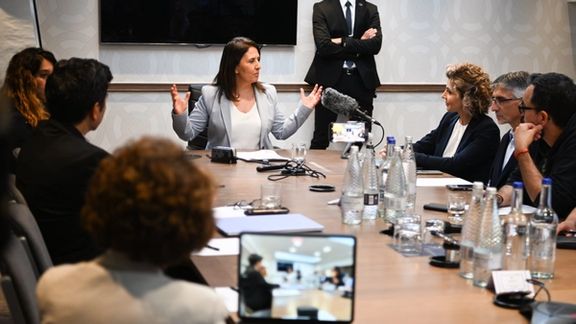
Israeli intelligence minister, Gila Gamliel, on Wednesday met Iranian journalists and activists in London, where she called on Iran’s opposition to unite.
She also was in the British capital to promote a campaign to sanction the IRGC as a terrorist organization. The meeting was unique because as a senior Israeli official she met with Iranian reporters and activists and she also said that she wants to put the focus on the IRGC, and convince European countries to sanction Iran's Revolutionary Guard, the IRGC.
The United States government sanctioned Iran’s Islamic Revolutionary Guard Corps as a Foreign Terrorist Organization in 2019, but European states have hesitated to take the step, although they have imposed many sanctions on IRGC officials and entities.
The Israeli minister said wishes to send “support messages to the Iranian people and that the West should be with the Iranians and not make it easy for the regime.”
She also talked about the importance of unity among the Iranian opposition figures and groups and how opinions should be respected and not be a reason for discord. The main goal should be against the regime, and this is the reason that she met with Prince Reza Pahlavi and she meets all kinds of opposition groups.
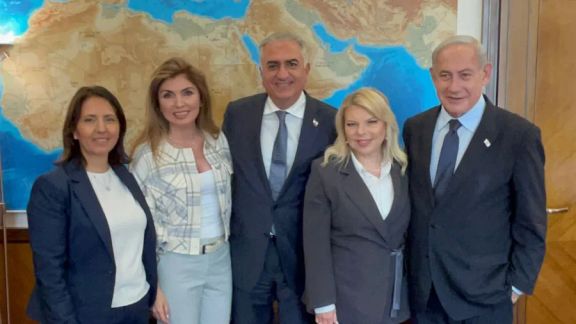
Iran’s exiled Prince Pahlavi made a historic trip to Israel in April, where Gamliel hosted him and his wife. Pahlavi also met Prime Minister Benjamin Netanyahu and Israelis of Iranian descent. At the time, the Israeli minister tweeted in Hebrew that "The visit of the Iranian crown prince that I led this week is only the beginning on the way to bringing hearts together and building bridges between the nations.“
Gamliel’s visit comes a little more than a week ahead of the one year anniversary of the Iranian regime’s murder of the 22-year-old Iranian woman Mahsa Amini, who was killed while in the custody of the notorious hijab police. The regime’s infamous morality police fatally wounded Amini for her alleged failure to properly wear her hijab.
Gamliel also issued two postings on X, formerly known as Twitter, about her meetings in London. She wrote an “important meeting with activists who are against the regime.” She noted the Iranian regime is not just a problem for Israel but for the entire world and Tehran spreads its weapons across the globe.
Gamliel also talked how the Islamic Republic is a murderous and violent regime. “The Iranian people and Israel should join hands and be united and solve the problem that bothers the world, “said the source about the minister’s comments. “She mentioned many Iranian victims in the protests, the children, the girls and many others.”
She stressed that “her goal is to change the opinions of leaders in the West so they go for sanctioning Iran and the IRGC. This is the reason that she meets a lot of leaders in the West, Italy, London and in the US.”
Gamliel wrote in the Israeli Maariv newspaper on International Women's Day in March, "The citizens of Iran are not Israel's enemies. Peaceful relations, respect and appreciation prevailed between the peoples for many years" before the Islamic Revolution in 1979.

A US House of Representative subcommittee will hold a hearing next week to examine the Biden administration’s secret dealings with the Islamic Republic of Iran.
Subcommittee on National Security, the Border, and Foreign Affairs of the House Oversight Committee will hold the hearing titled “A Dangerous Strategy: Examining the Biden Administration’s Failures on Iran.” The session will examine “how the Biden administration has repeatedly engaged in secret negotiations with Iran, ignoring the emerging threats arising from Iran and its proxies.”
The hearing on September 13 “will also look at ways the Biden administration has fallen short in assisting Americans trapped abroad and circumstances around dismissals of high-level officials.”
This appears to be the first full-fledged examination of the administration’s Iran policy after several revelations since late in June that have worried many observers and the Iranian American community.
In late June, Iran International first reported that President Joe Biden’s envoy for Iran, Robert Mallay was put on unpaid leave after his security clearance was suspended and the case was being examined by the FBI. To date, the administration has remained silent about what the underlying reasons were for Malley’s suspension, while other officials continued to hold secret talks with Iran with the mediation of Oman and Qatar.
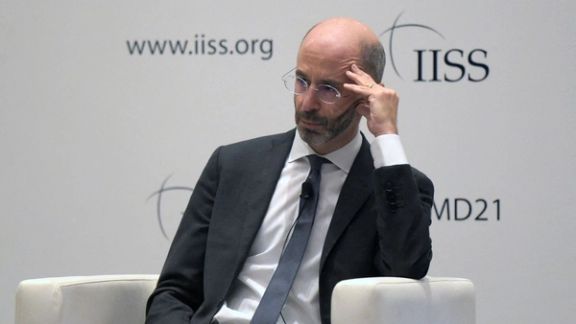
In August, it was announced that the United States had agreed to unblock $6 billion of Iranian funds frozen at South Korean banks, weeks after it allowed Iraq to unfreeze $2.7 billion.
At the same time, it was announced that Iran had released five American hostages form prison into house arrest pending the full release of its funds before they would presumably be allowed to leave the country.
Critics accused the administration of paying outright ransom for the hostages, while the deal still left two more prisoners behind.
The media have also reported that the Biden team is secretly negotiating with Iran over a partial, unofficial understanding to reduce Tehran’s high-level uranium enrichment. The UN nuclear watchdog, the International Atomic Energy Agency (IAEA) says that Iran has accumulated more than 120 kilograms of uranium enriched to 60 percent, which can be easily purified further to reach 90-percent, enough for up to five nuclear bombs. However, the pace of the enrichment has slowed down in recent weeks, giving credence to reports of a secret deal with Washington.
According to a 2015 INARA law, any administration trying to reach a nuclear agreement with Iran should keep Congress informed, which has the right to review the deal.
With the release of Tehran’s blocked funds and reports of more secret talks, Republicans in Congress began accusing the administration of potentially violating the Iran Nuclear Agreement Review Act of 2015 (INARA).
The Subcommittee on National Security is headed by Glenn Grothman (R-Wis.). At this point, details about the hearing and potential participants are not clear.
In announcing the hearing Rep. Grothman said in a statement, “The Biden administration’s foreign policy decisions regarding Iran continue to defy logic and are actively making Americans less safe at home and abroad. Despite promises, the Biden administration has failed to deliver transparency throughout negotiations…”
The Subcommittee Chairman went on to say, “The Iranian regime poses a great threat to American foreign interests and stability in the Middle East region and this hearing is a great opportunity to examine all these issues and provide Americans at home with what the Biden administration refuses to: transparency and answers.”
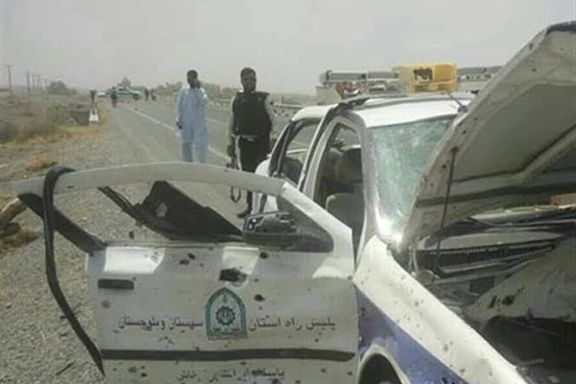
Two Iranian police officers, including a conscript, lost their lives when gunmen targeted their station in the city of Taftan, located in the restive Sistan and Baluchestan province in southeastern Iran.
The Iranian government labeled this attack as an act of terrorism while the gunmen responsible remain at large.
The Intelligence Organization of the Islamic Revolutionary Guard Corps (IRGC) and the Ministry of Intelligence issued a joint statement claiming the act was carried out by a network involved in "disruptive activities."
The statement, while lacking specific names or evidence, asserted that they had identified and targeted several members of the network, which it claimed had "financial support purportedly from the US Department of State.”
It also claimed members of the network had been providing free online training to activists in the women's and civil society sectors, both within and outside Iran, though there was no clear evidence given.
Furthermore, the intelligence organizations alleged that the group had recently conducted a training workshop for women's sector activists in May at a university in England with more planned this month, targeting civil activists and women in the online sphere with the intention to create more domestic uprising.
There have been reports of numerous attacks on military and government forces in the province in the past and since nationwide protests broke out in September 2022. The provincial capital Zahedan was the scene of a government massacre when around 90 citizens were gunned down during a protests September 30.






